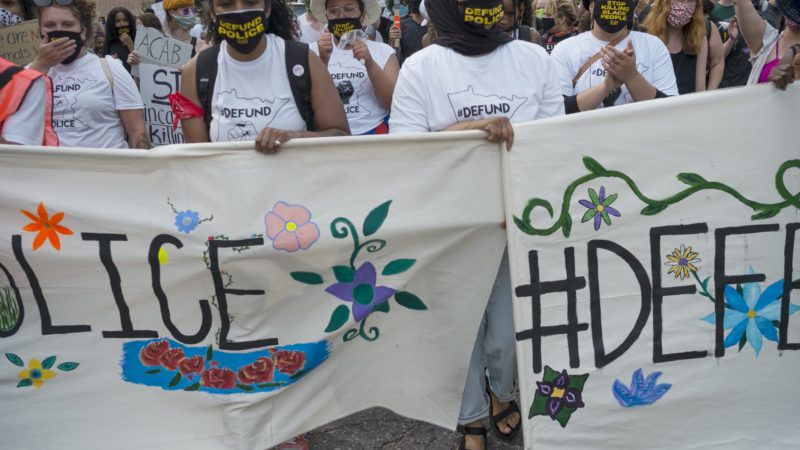Minneapolis Leaders Vow To Defund the Police
Plus: Police unions love Amy Klobuchar, Seattle can't quit tear gassing protesters, and more...

Members of the Minneapolis City Council say they will stop funding local police. On Sunday, a majority of council members pledged support to disbanding the city's entire police department.
"Nine of the council's 12 members appeared with activists at a rally in a city park Sunday afternoon and vowed to end policing as the city currently knows it," the AP reports. One council member, Jeremiah Ellison, said the council would "dismantle" the Minneapolis Police Department.
Council President Lisa Bender said the aim was "to end policing as we know it and recreate systems that actually keep us safe."
No formal moves have been made, so it remains to be seen whether this is anything more than empty words from Minneapolis city leaders. (For now, the state of Minnesota has opened a civil rights investigation into the Minneapolis Police Department in response to the killing of George Floyd.) Cities have disbanded their entire police departments before, as the AP points out:
In 2012, with crime rampant in Camden, New Jersey, the city disbanded its police department and replaced it with a new force that covered Camden County. Compton, California, took the same step in 2000, shifting its policing to Los Angeles County.
It was a step that then-Attorney General Eric Holder said the Justice Department was considering for Ferguson, Missouri, after the death of Michael Brown. The city eventually reached an agreement short of that but one that required massive reforms overseen by a court-appointed mediator.
Of course, if you replace a particular police department or units with a similar structure, that doesn't necessarily mean you'll get much different results.
The city of Columbus, Ohio, disbanded a portion of its police unit—the violence-, scandal-, and FBI-investigation-besotted vice squad—back in 2019, with promises to orient efforts around more community-minded actions. But Columbus city cops were doing the same old vice policing under different branding not long thereafter. Indeed, the city didn't even give it a rest during the brief pause: It simply relied on county cops or federal agents to do things like prostitution stings.
Defunding law enforcement has become a big rallying cry in recent protests against police brutality and the state-sanctioned murder of George Floyd, Breonna Taylor, and other Americans. This has not just law-and-order conservatives but a lot of centrists somewhat freaked out.
Hey conservatives those police you don't want to defund are the same ones who ticketed you at church recently in case you forgot.
— ????????Austin Petersen ???????????? (@AP4Liberty) June 8, 2020
It's a slogan, you guys. It's short and easy to write on signs. It's also somehow broad enough to accommodate a range of intentions—to be meant quite literally by some and by others as light hyperbole in the way of protest slogans immemorial. It's become shorthand for proposals all the way from total police and prison abolition to reforms like curtailing federal funds for local police, ending the provision of military gear, or simply cutting police budgets. Despite the big talk from Minneapolis officials right now, a full-fledged defunding of the police is an idea with little chance of actually taking hold anytime soon. It's the kind of ask you start with to move the Overton window on potential reforms.
Some on the side of police reform have been expressing well-intentioned worries that "defund the police" rhetoric will discredit protesters or scare off moderate supporters. Perhaps. But it seems to me that just about anything protesters do draws consternation from certain quarters and will be sensationalized in the press no matter what. When reformers admonish people for calls to cut police budgets, they're doing the work of those they're supposed to be working against.
I think it's ultimately futile to spend time fretting about how relatively mild rhetoric like defund the police will play out politically, and that it distracts from more productive discussion. Instead of simply writing off the line as politically toxic, perhaps it would be more useful to try and demystify and deradicalize the idea of cutting police budgets. Two good places to start: looking at how such efforts played out in the past, and stressing which parts of police budgets are most ripe for defunding.
QUICK HITS
• On Friday, Seattle Mayor Jenny Durkan promised that police would refrain from tear gassing protesters for at least 30 days. Here's how that worked out:
Literally *yesterday* Seattle's mayor and police chief said they would ban the use of tear gas for 30 days. See how good their word is? https://t.co/RZsWJ3a34z
— Harper Jay (@transgamerthink) June 7, 2020
• In Washington, D.C., thousands of people gathered for a peaceful protest march around Capitol Hill, the National Mall, and the White House on Saturday.
• Sen. Amy Klobuchar (D–Minn.), allegedly on Joe Biden's short list for vice presidential picks, is one of the top Congressional recipients of police union money:
Top congressional recipients of police union donations:
House:
Bill Pascrell (D-NJ): $43,160
Steny Hoyer (D-MD): $35,500Senate:
Patrick Leahy (D-VT): $21,250
Amy Klobuchar (D-MN): $15,000https://t.co/GBFmsLzQcm pic.twitter.com/PMYTOxjjym— Thaddeus Russell (@ThaddeusRussell) June 8, 2020
• Expect these seven Supreme Court decisions in the next few weeks.
• The U.S. Marine Corps just banned public displays of the Confederate flag.
• Florida's schools have become a high-stakes experiment in classroom policing.
Show Comments (264)